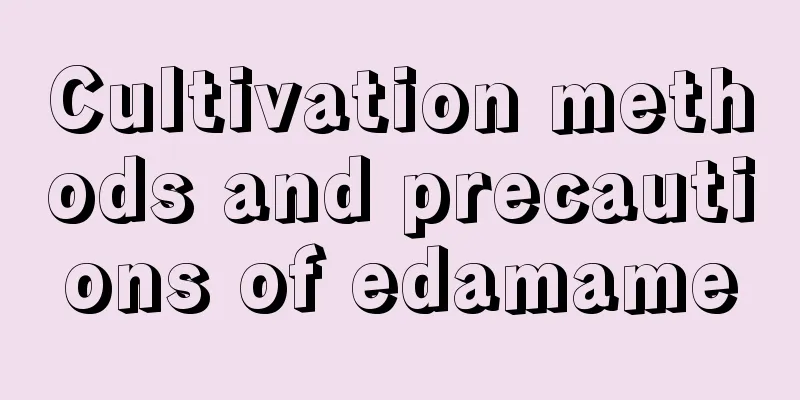Cultivation methods and precautions of edamame

1. Maintenance methods1. Temperature: It likes high temperature and is suitable for growing in areas with relatively high temperatures. The germination temperature of its seeds is around ten degrees. At fifteen degrees, the seeds germinate very quickly. The growth temperature should be controlled between twenty and thirty degrees. When the temperature is below fourteen degrees, the plant will not bloom. It is very sensitive to temperature during the growth period. If the temperature is too high, the plant will end the growth period prematurely. When the temperature is too low, the seeds of the plant will not fully mature. 2. Watering: It requires a lot of water during its growth period, especially when the seeds are developing, it needs to absorb a large amount of water. During this period, it generally needs to be watered every other day. When the plant reaches the seedling stage, it needs to be watered two to three times a week. When it reaches the pod-forming stage, it needs to be watered every other day. 3. Fertilization: It accumulates nutrients about thirty days before flowering. At this time, vegetative growth and reproductive growth proceed together, requiring a large amount of nutrients. During this period, fertilizer is required once every two weeks. The amount of fertilizer needs to be increased two weeks after the flowers bloom, because the beans will grow rapidly at this time. If the nutrient supply is insufficient, it will cause the plant to age prematurely and cause the flowers and pods to fall off. 4. Light: It is a short-day plant and does not have strict requirements for light. Normal light per day is enough, and ensure about five hours of light. 2. Breeding techniques1. Reproduction: It can be cultivated by direct seeding in the open field. Choose mid-ripening varieties and sow them directly through holes in the open air in early to mid-April. They can usually be harvested between June and July. 2. Weeding: When cultivating edamame, it is necessary to weed the field because weeds will compete with plants for nutrients. Therefore, it is necessary to remove the weeds regularly to avoid unnecessary nutrient consumption. 3. Problem Diagnosis1. Pests: The number one pest of the plant is the borer. During the growing season, it needs to be sprayed with carbendazim every week to enhance its resistance. If unfortunately infected, the infected plants need to be pulled out and destroyed, and the plants need to be sprayed with pesticides for prevention and control. It should be noted that plants sprayed with medicine cannot be picked and eaten for the time being, and should be picked after a week. 2. Pathology: If the branches and leaves of the plant turn yellow, it may be due to insufficient nutrients and you need to add nutrients to it. IV. Other issues1. Edible: edible. 2. Toxicity: non-toxic. |
<<: Cultivation methods and precautions of wolfsbane
>>: Cultivation methods and precautions of Shenjinhua
Recommend
How to grow crabapple
1. Soil If you want to grow crabapples, you shoul...
Maintenance methods and management of Chinese photinia bonsai cultivation and care techniques
The plant of Photinia chinensis likes sunlight bu...
Can orchids be grown in coconut coir?
Can orchids be grown in coconut bran? Coconut bra...
Give the flowers a thorough cleaning during the Chinese New Year, and the leaves will instantly turn green and the flowers will bloom more brightly!
Just wipe the leaves, all the dust will go away, ...
When and how to plant chrysanthemum
Planting time of Artemisia selengensis The best t...
Immortal finger picture
The function of the fairy finger The fairy finger...
Does Aloe Vera Like Water or Drought?
Does Aloe Vera prefer moisture or drought? Aloe v...
What is the best month to plant durian? What is the best season to plant durian?
Which month is suitable for planting durian? Duri...
How to grow lucky bamboo in water
1. Container The container for hydroponic lucky b...
Spend the first half of your life making money to support the family, and the second half of your life growing vegetables and flowers!
The courtyard gate is surrounded by wooden fences...
Milan flower cultivation methods and precautions
How to grow Milan flowers Maintaining good soil q...
How to plant honeysuckle in pots? How big a pot should I use?
1. Prepare the soil When potting honeysuckle, cho...
How to grow daylily in pots
Planting conditions Daylily does not have too man...
Should I use a large or small pot for growing wine bottle orchids?
Should I use a large or small pot for my wine bot...
Frangipani cultivation methods and precautions
How to grow plumeria Soil selection Frangipani is...









